Our history
Spare Tyre has been at the forefront of debate on identity politics around enduringly prescient themes: Women and Gender; Age and Dementia; and Disability. We are widely acknowledged for our pioneering approach to participatory arts.
We are a leading participatory theatre charity with 40 years experience working with diverse communities where opportunities are lacking. Our mission, vision and passion have remained constant for 40 years. We raise the voices of disadvantaged and marginalised people within the UK through fun, play, and empowerment. Throughout our projects we enable hidden stories to be validated, moving from personal fulfilment to political recognition.
The UK participatory arts movement grew out of the social activism and counter-culture movement of the 1960s and 70s. It is inextricably linked to the history of the UK – reflecting and influencing the feminist movement, disability rights and equality movements, the empowerment of older people, the LGBTQ+ movement and gender rights issues. Throughout our history Spare Tyre’s projects have provided a platform for unheard politics and voices, making them more widely visible by engaging different sections of society with the arts. Social action partners on projects have included charities such as Oxfam, Age UK, Mencap and Solace Women’s Aid, working together to use artistic action to drive wider societal impact.
Spare Tyre began in Camden, a key player in the politicised alternative theatre movement. Our initial focus was on women and body image, with a seminal text of the day (‘Fat is a Feminist Issue’ by Susie Orbach) inspiring our first performance ‘Baring the Weight’. Our productions toured nationally and were cabaret, musical and agit-prop in style. They were targeted at female audiences, challenging attitudes and behaviour both at a personal and societal level.
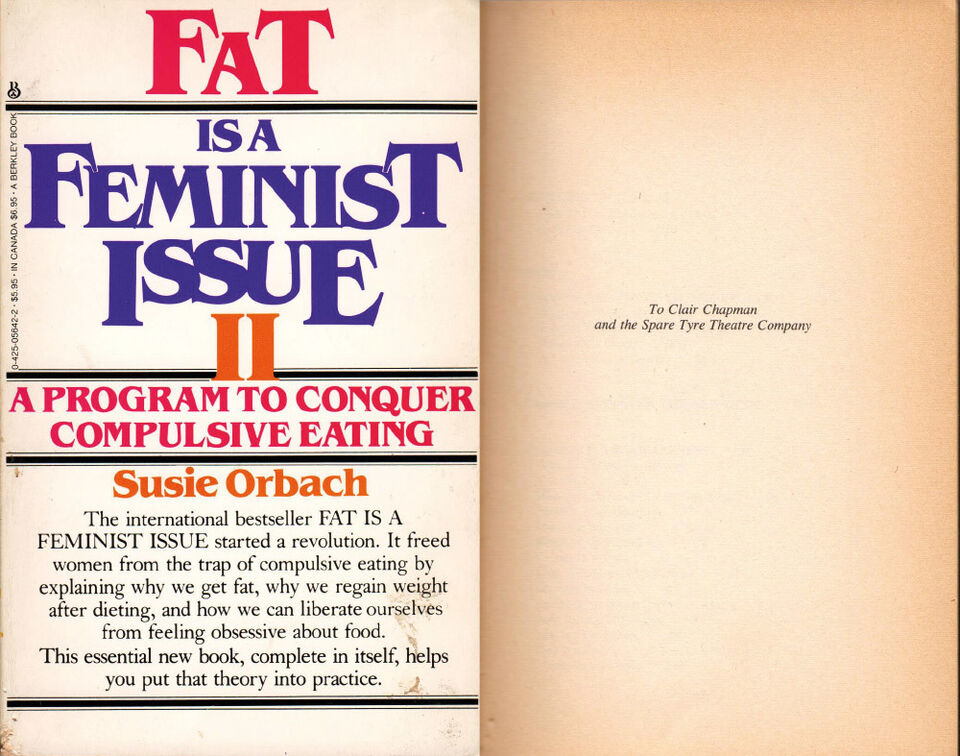
Photo: Nick Hider
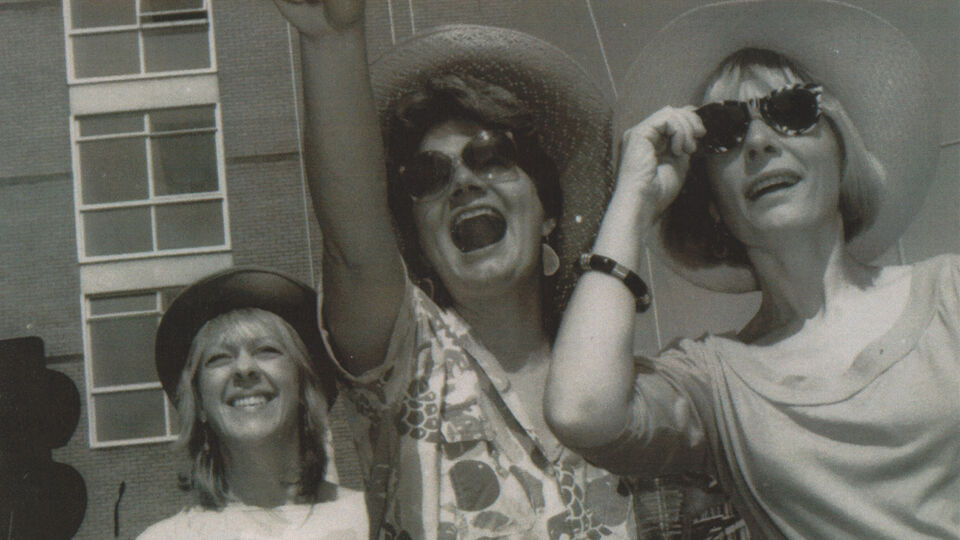
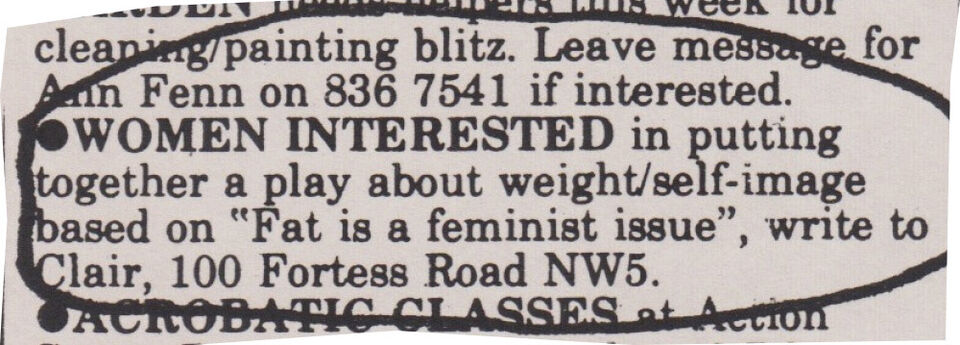
When Clair Chapwell posted a call in Time Out magazine for women who were interested in creating a play based on ‘Fat Is A Feminist Issue’ an overwhelming number of women whose lives had been changed by this book responded. They came together to devise Spare Tyre’s first ever show in 1979 'Baring the Weight'. The next few years saw Clair team up with Harriet Powell and Katina Noble, together known as the three founders of Spare Tyre. They toured the UK with cabaret shows and continued to produce comic work focusing on the theme of women and representation.
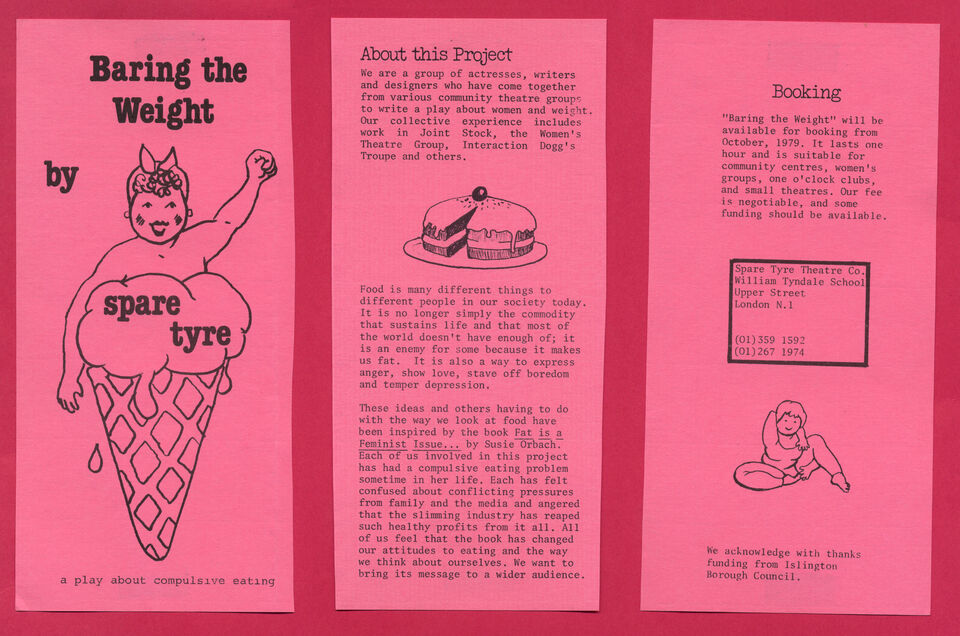
The next few years saw Clair team up with Harriet Powell and Katina Noble, together known as the three founders of Spare Tyre. They toured the UK with cabaret shows and continued to produce comic work focusing on the theme of women and representation.
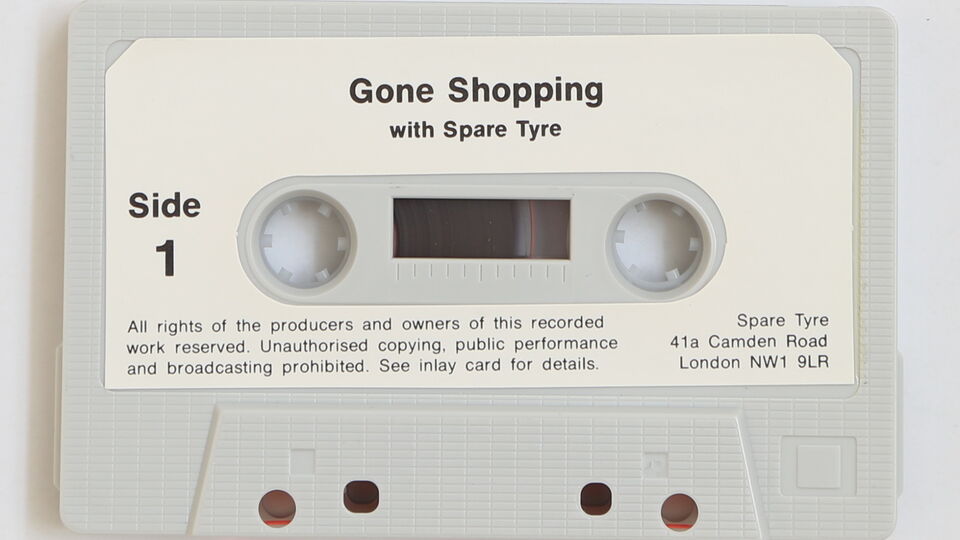
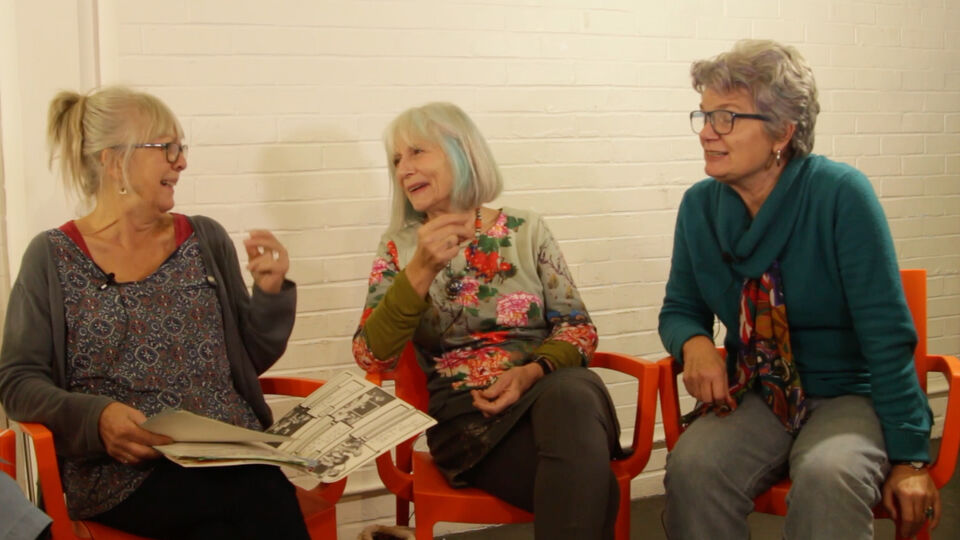
The 1980s saw the participatory method of the company begin to take shape. We looked at issues of importance to women that few others were daring to discuss openly (including pregnancy, contraception, being single, tampons), creating work around sexism and prejudice. The shows 'How Do I Look'? (1980), 'Woman’s Complaint' (1981), 'On the Shelf' (1982) and 'Eat Your Heart Out' (1983) were produced during this era.
Spare Tyre has been innovative and challenging since its inception
Danny Braverman, Lecturer in Theatre & Performance, Goldsmiths University
During the late 1980s and 90s our remit expanded in response to pressing social and political topics, in the same way it continues to evolve today. ‘Fists and Fingernails’ (1987) and ‘The Pink Project’ (1997 - 2007) are examples of our work around LGBTQ+ issues and gender prejudice – we were one of the first companies who took performances about gay rights into schools – as well as the empowerment of older people and adults with learning disabilities, homelessness and poverty.
From 2001 we began to build ground-breaking inclusive ensembles which have inspired many other companies since. We devised theatre with learning disabled adults and older people, bringing them together to share their personal stories with friends, family, and their communities, as well as with the wider public. We gave them the stage and let them tell the stories in the way they wanted to, enabling them with a structure that gave them ownership of the process.
'Pieces of Ourselves' Photo: Patrick Baldwin
We pushed the boundaries of what theatre meant for these participants – creating surreal, abstract, absurd performances. We increasingly used new technology, experimenting with multi-media and film, especially as part of the accredited training course 'inc.Theatre' – key shows produced under this programme include 'I’m an Artist Let Me In', 'The Art Room', and 'Dark Inc'.
The work was now primarily London-based, prioritising community issues and connecting with key venues such as the Albany, Redbridge Drama Centre, Tara Arts, and Chats Palace among others. Our 'Go Inc to Work' scheme was one of the first professional performance training programmes for learning disabled adults, supported by the Trust for London.
The growing prevalence and recognition of dementia as a major issue in an increasingly ageing society took our work in this direction from 2011. Working responsively, we became more multi-sensory and multi-artform in our approach, with productions touring nationally once again – such as 'The Garden', which began in 2015 and continues to tour today.
'Once Upon a Time' Photo: Patrick Baldwin
Our method
We embrace an inclusive theatre method. It is particularly important for our work with learning disabled adults, enabling our participants and artists to be co-collaborators.
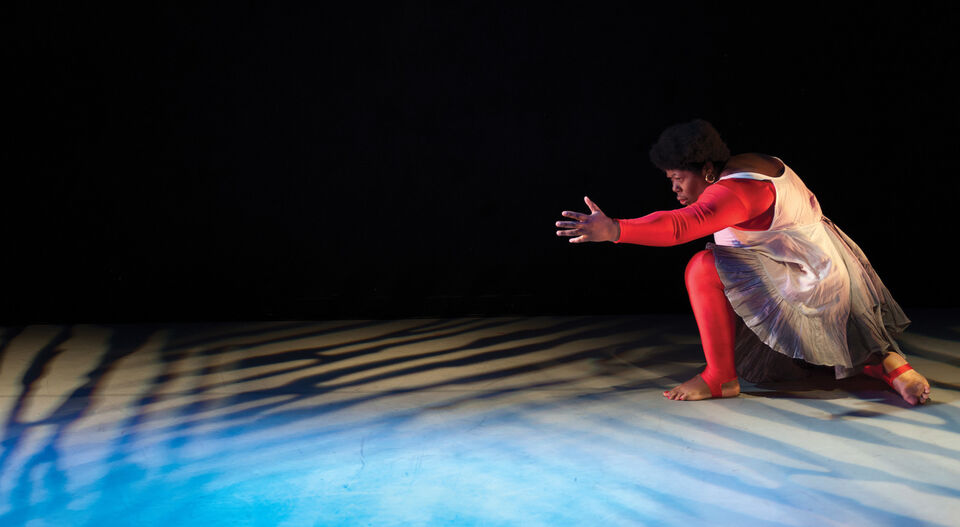
As our work with learning disabled adults developed we increasingly brought in different artforms beyond pure drama – music, dance, movement, film, photography – a ‘total theatre’ experience. By removing the need for scripts and learning words we moved away from traditional forms of theatre and took steps toward becoming more accessible to a wider range of people.
Some of the styles of theatre we have used, such as Buffont, helped bring political edge to the work – they are the styles of the outsider. These challenged audiences, particularly when seeing disabled people and people aged 60+ in taboo-busting, stereotype-subverting productions - 'Feeble Minds', 'Angina Monologues', and 'Trojan Women' are just a few examples.
Evolution remains fundamental to the way we work, responding to the changing needs of society and the different communities we engage with, as well as continuing to embrace new technology.
A key shift in our way of working came between 2000 and 2005, when a transition in the leadership of the company began. Clair Chapwell, Spare Tyre’s original Artistic Director, continued to work primarily with older people leading the 'SCAT' (Seniors Confronting Alienation through Theatre) project. Arti Prashar joined as Associate Director, leading the work with learning disabled adults. After a period as co-Artistic Directors, Arti Prashar took over as Artistic Director in 2006.
Arti, an Asian female artist, was one of the first to break through that particular ‘glass ceiling’ by becoming a female BAME leader of a non-culturally specific organisation. Her cultural background has strongly influenced both her own and therefore the company’s long-standing attitude to accessibility and inclusiveness – the company adopted the tagline ‘Theatre without Prejudice’.
Through meaningful engagement we support people to fulfil their potential, whether they are producers or administrators, artists or participants. From 2010 we began to articulate it as a core part of our strategy, formalising our volunteering, placement and traineeships through the 'Spare Parts' programme. We were at the forefront of providing paid internships, supported by foundations such as the Walcot Foundation. We cultivate and develop artists from diverse backgrounds who we know will continue creating brilliant and powerful participatory arts with communities across the country. We believe in the importance of carefully nurturing people in the long-term to pass on our knowledge, encouraging spontaneity and fun.
Our method of devised theatre enables people to tell their own story – it is never someone else’s script, and it brings personal investment. Whether with professional or community performers, it relies on building the ensemble. This builds greater understanding and acceptance of individuals. It brings people together around themes such as women, disability, gender and age.
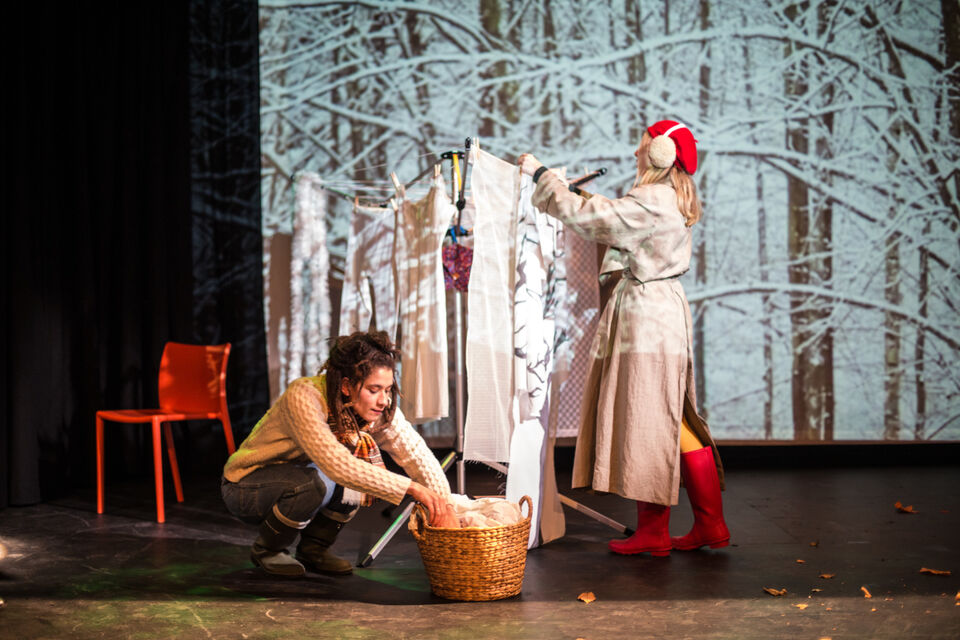
It is a great opportunity to discuss and work through disagreements, leading slowly to a quality co-produced product. Those critical moments of conflict and then resolution within the creative process produce unexpected, moving and extraordinary results, seen in projects such as 'Pieces of Ourselves' and 'Fists and Fingernails'. The devising method has also led to experimentation with different artforms, a result of our search to find the best way to describe, tell and present these very personal experiences for artists, performers and audiences.
Spare Tyre is making exciting art for people at the fringe of society
2016 Audience member
Who cares?
It should not matter who is telling the story, but it does matter. Often our shows and work are seen as political statements simply because we have disenfranchised people standing on a stage telling their stories. Our shows have often been called ‘honest theatre’. That label eludes to the emotional impact our work has on both the people we co-create with, and the audiences who see it. Sometimes it is seen as 'protest theatre'.
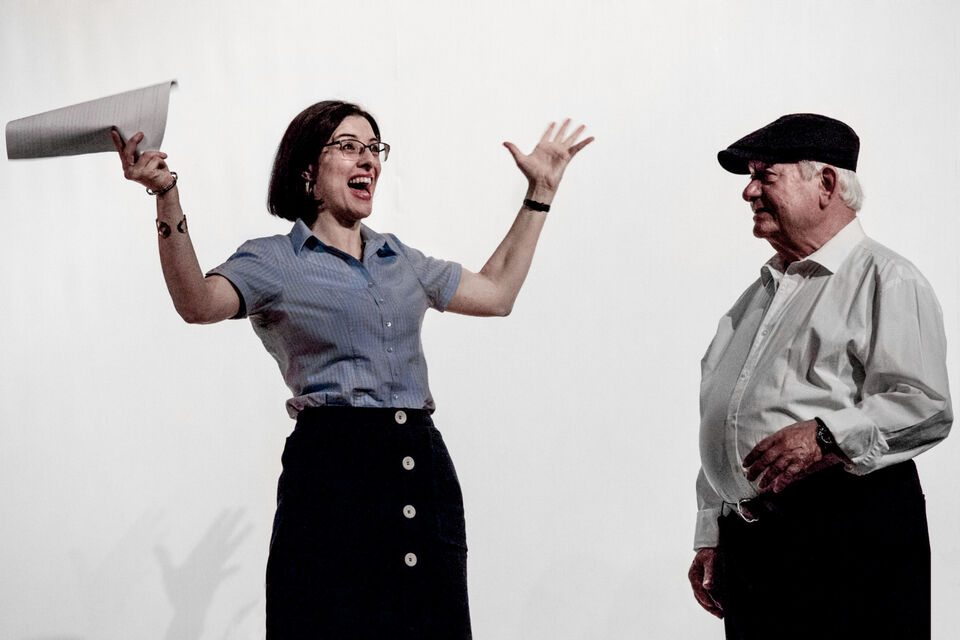
During weekly workshops people open up to us, telling us their secrets, their wishes, their desires, their anger. We are privileged to be let into their lives – people aged 60+, women who have experienced violence, learning disabled people, carers, artists.
We put a lot of emphasis on the way we engage with people, through a process of co-creation, going on a journey that may lead slowly to a co-produced product that must be of quality – our audiences are buying a ticket, after all.
It matters how things are created, who is touched by it, where the stories originate. It matters that care is taken to listen, to represent communities honestly, to take time to nurture and to build confidence and skills. Our approach is collaborative and done with immense care. What does care mean? It is about being responsive to people's individual needs, treating their stories with respect, honouring their intentions and giving people control even if that means taking risks.
Spare Tyre has enabled me to think about my disability and myself in a more positive way and has given me more confidence… The staff and the other artists take me for who I am and I’ve never had people treat me like that before
Ellie Mason, Spare Tyre artist

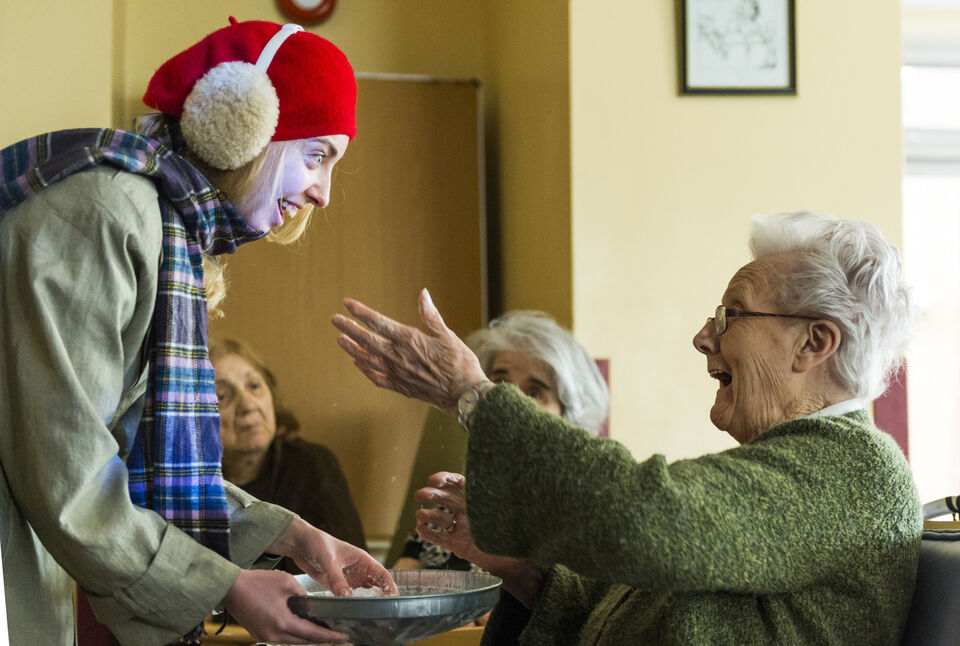
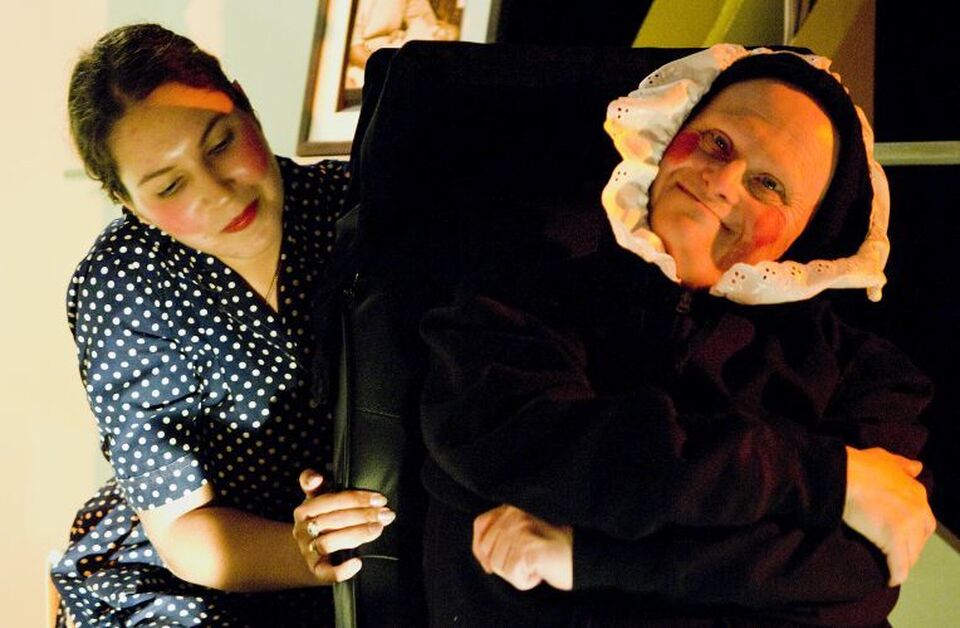
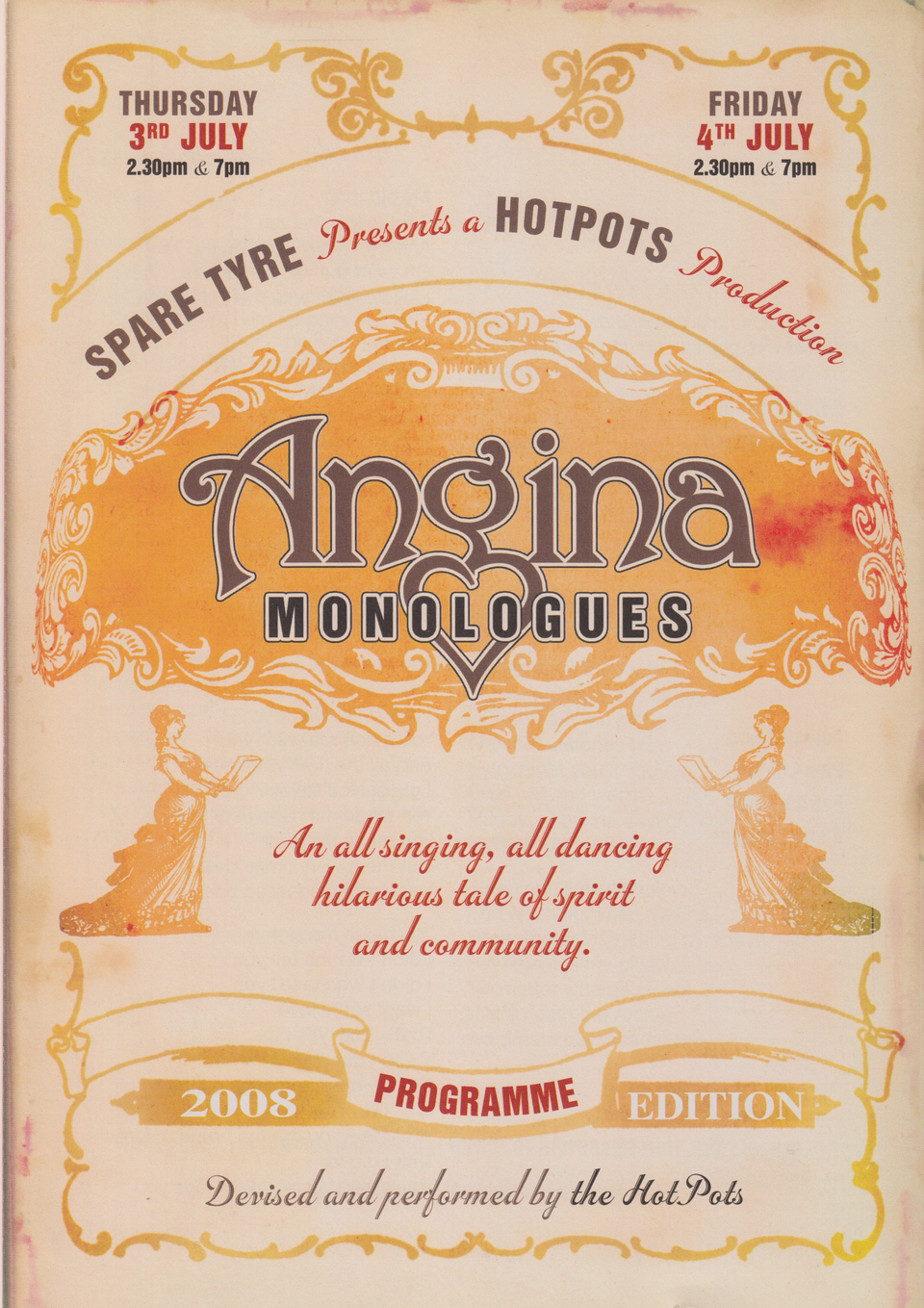

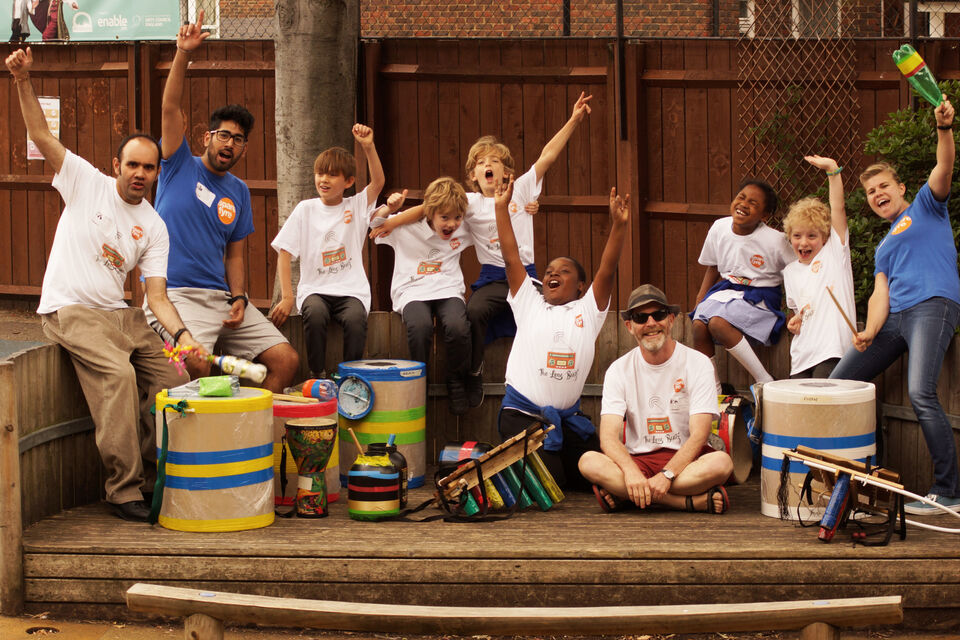
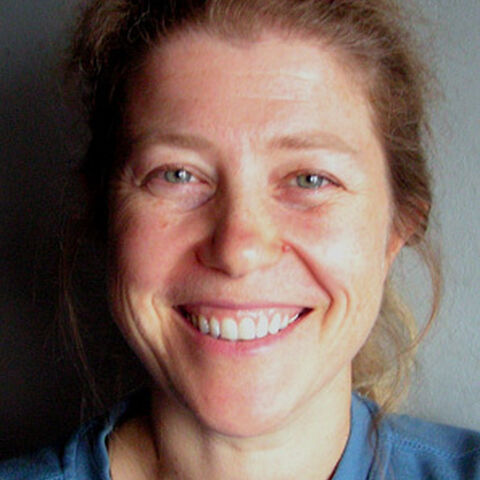

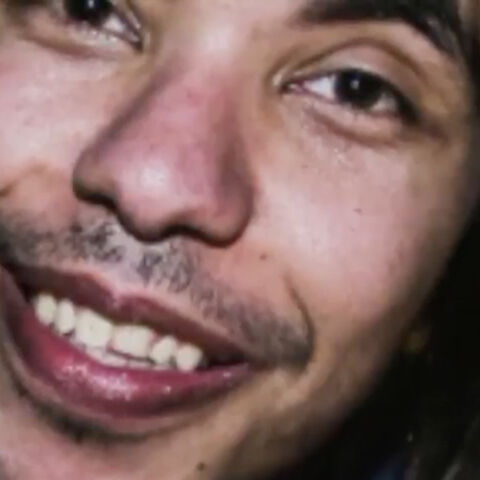
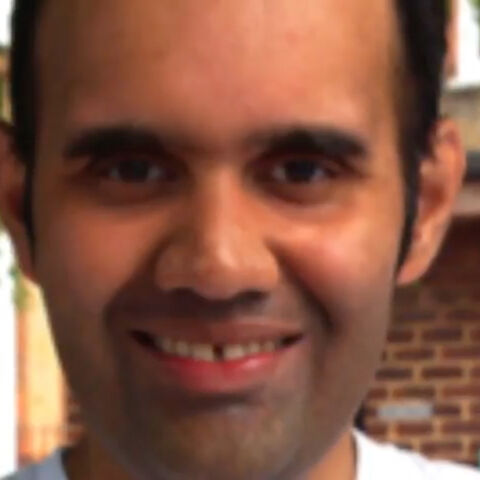
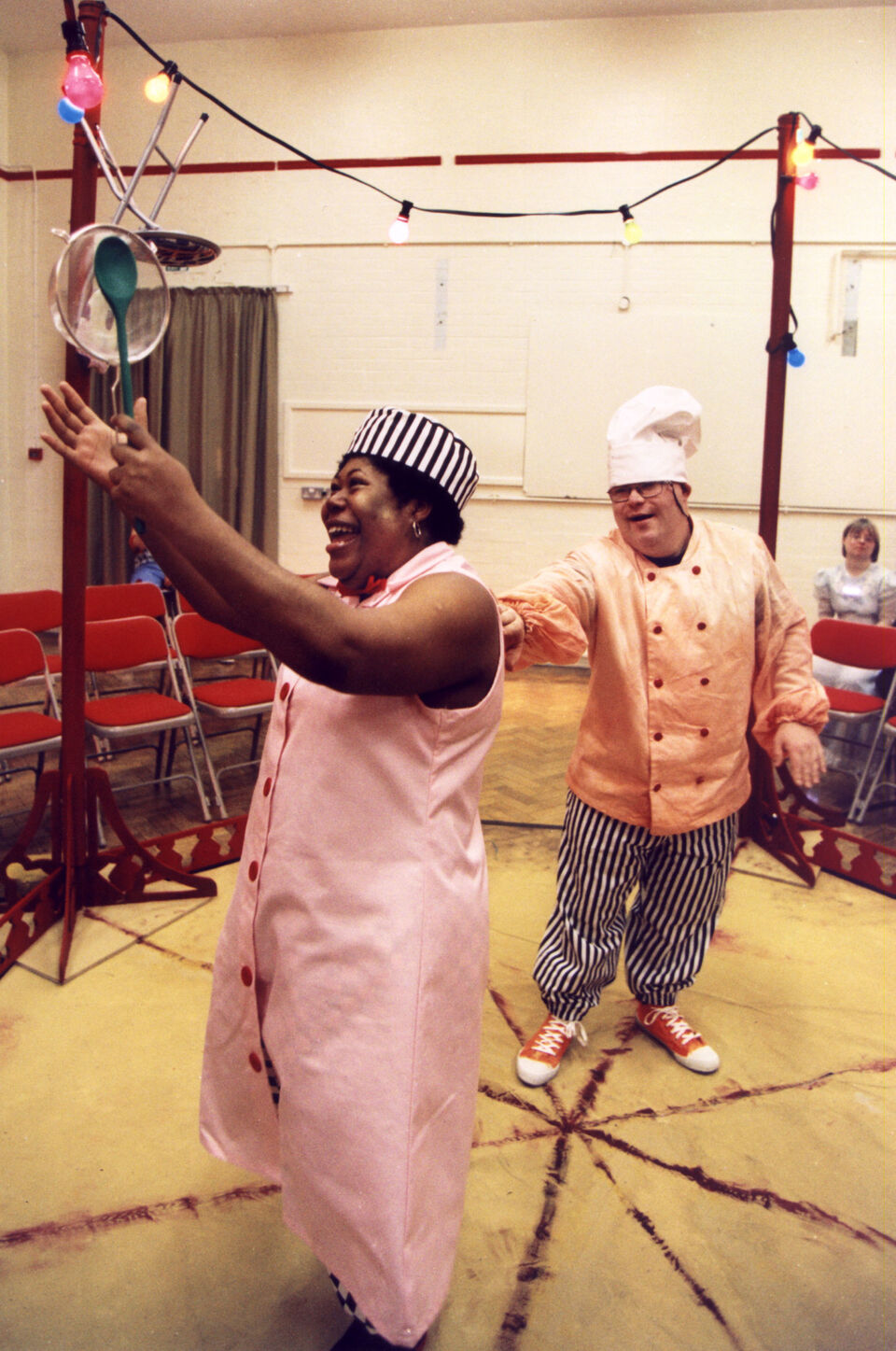
 Baring the Weight
Baring the Weight
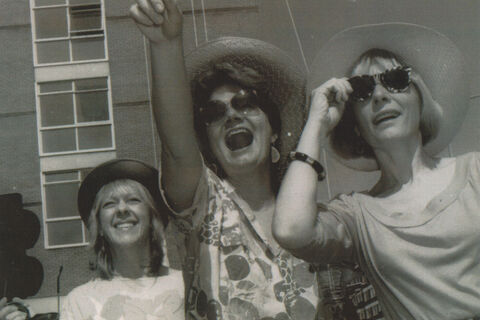 How Do I Look?
How Do I Look?
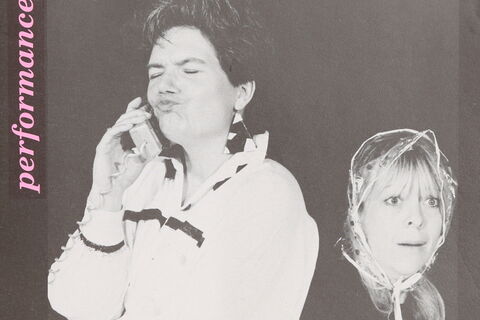 Woman's Complaint
Woman's Complaint
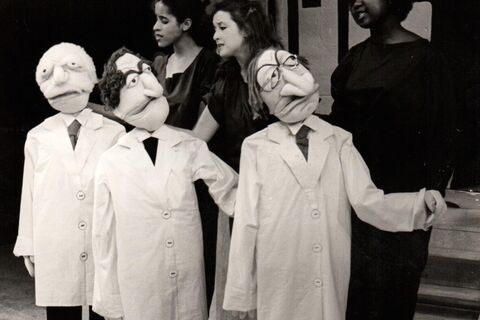 Doctor
Doctor
 On the Shelf
On the Shelf
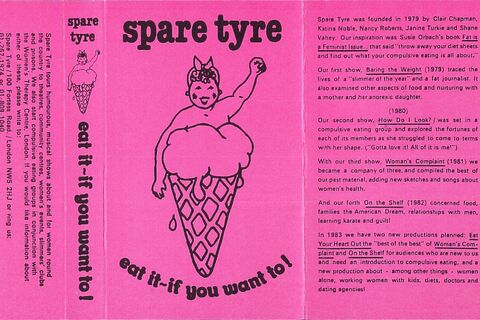 Eat Your Heart Out
Eat Your Heart Out
 Just Desserts
Just Desserts
 Shhh!
Shhh!
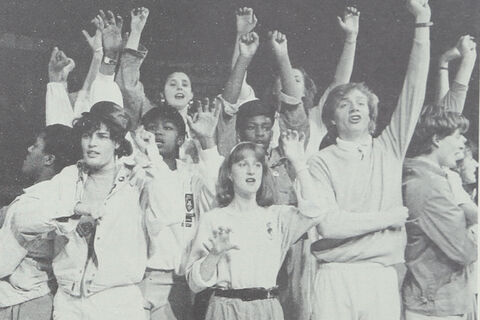 You've Gotta Be Kidding
You've Gotta Be Kidding
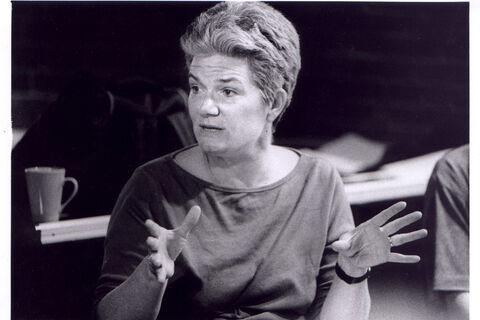 The Invisible Woman
The Invisible Woman
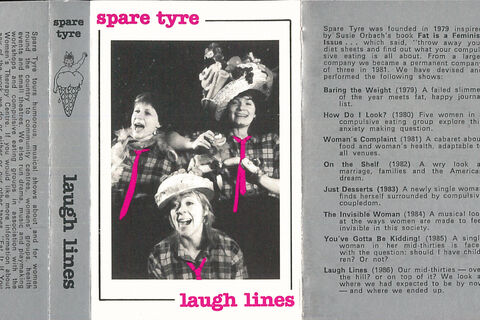 Laugh Lines
Laugh Lines
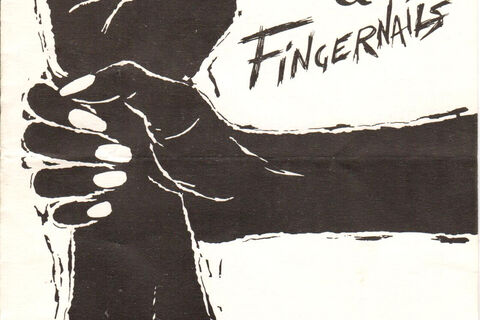 Fists & Fingernails
Fists & Fingernails
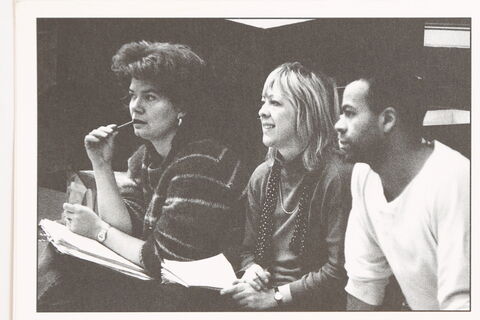 Stepping Out
Stepping Out
 Head Over Heels
Head Over Heels
 Gone Shopping
Gone Shopping
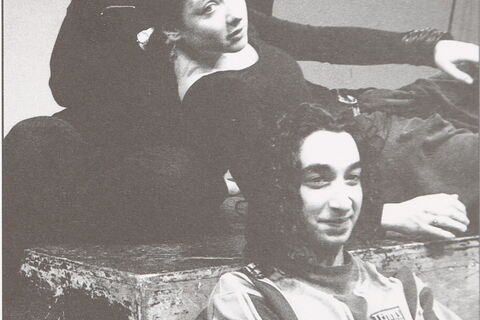 Odd Jobs
Odd Jobs
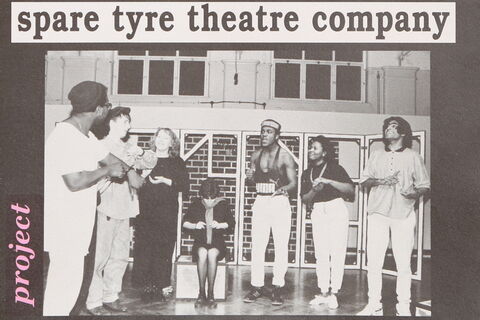 Under the Carpet
Under the Carpet
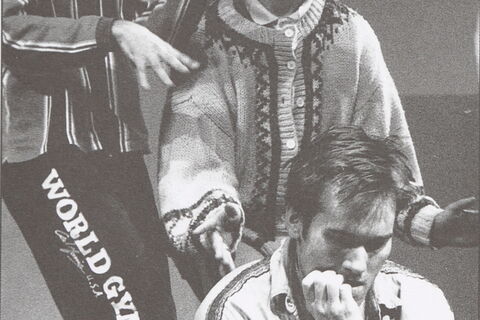 Behind the Smile
Behind the Smile
 Pouring It Out
Pouring It Out
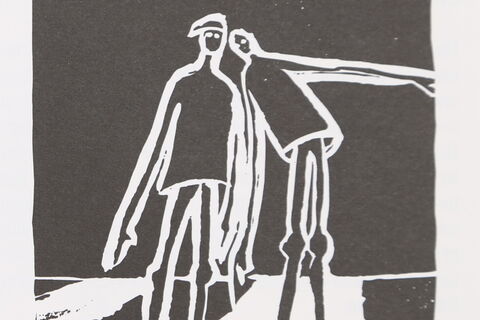 Compete with your Feet
Compete with your Feet
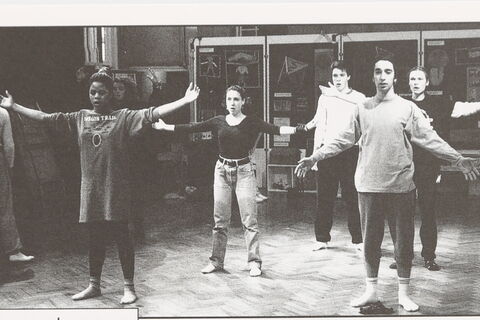 Must Fly
Must Fly
 Oxfamtastic: Whose World?
Oxfamtastic: Whose World?
 Poor World
Poor World
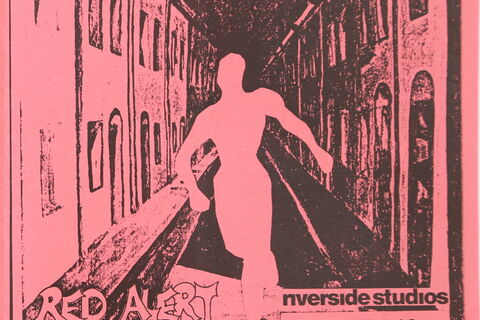 Out of the Frying Pan
Out of the Frying Pan
 In My Day
In My Day
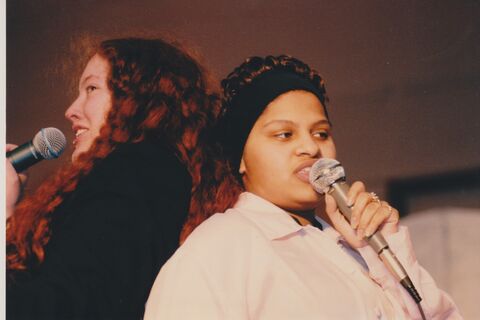 The Sharp End
The Sharp End
 Gas Mask on my Shoulder
Gas Mask on my Shoulder
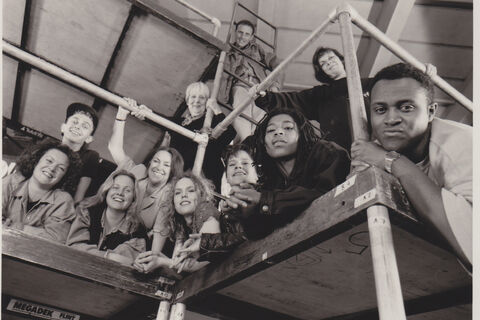 Dancing in the Dark
Dancing in the Dark
 Shortchanged
Shortchanged
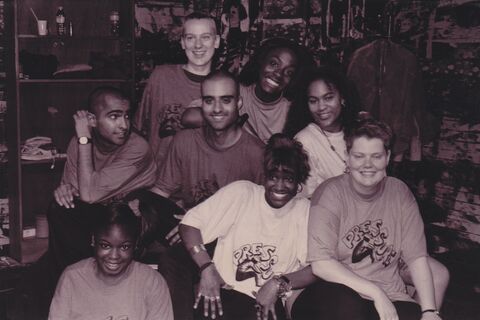 Pressure!
Pressure!
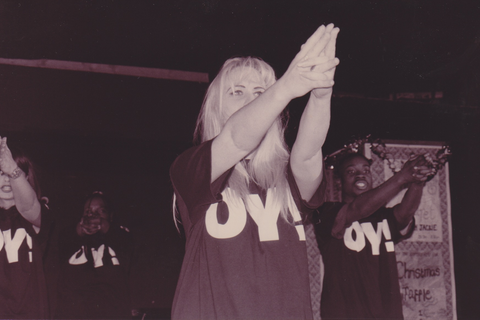 Oy!
Oy!
 A Present for Myself
A Present for Myself
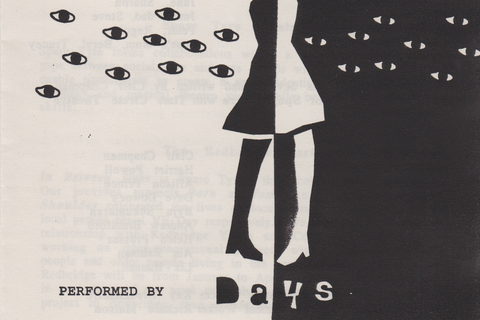 Inbetween Days
Inbetween Days
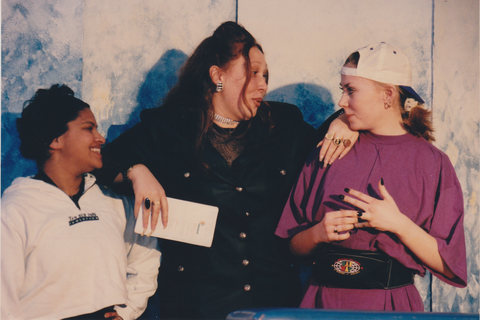 Going Places
Going Places
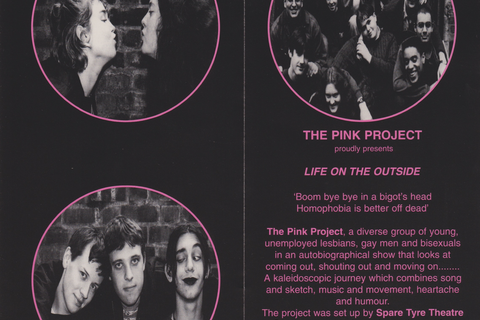 Life on the Outside
Life on the Outside
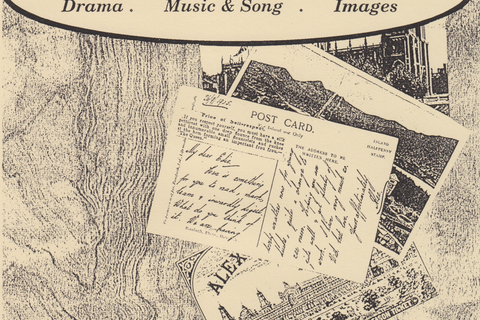 I'll Tell You A Life
I'll Tell You A Life
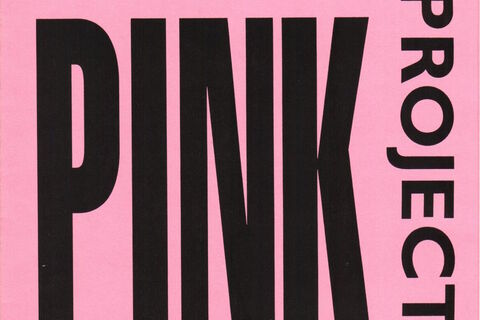 The Pink Project
The Pink Project
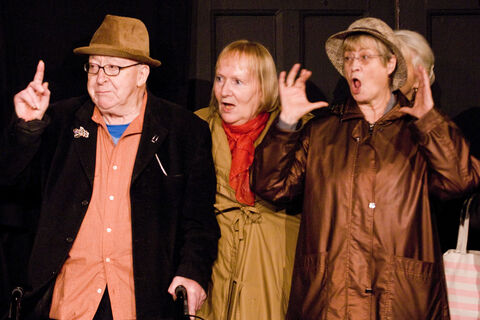 The River Project
The River Project
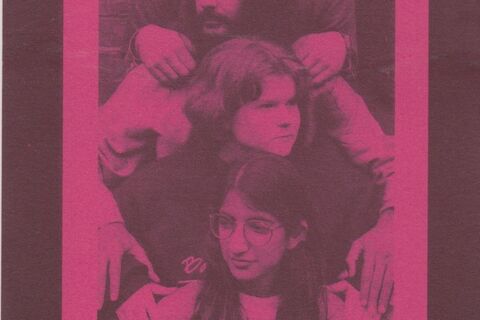 Crossing the Tracks
Crossing the Tracks
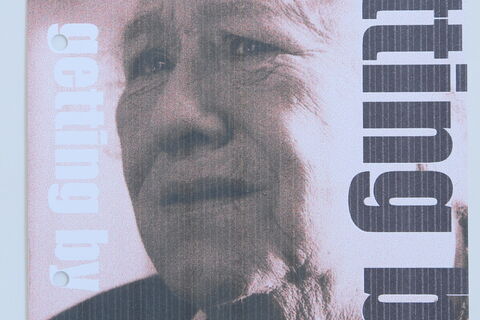 Getting By
Getting By
 Families: A Rough Pink Guide
Families: A Rough Pink Guide
 The Old Joanna
The Old Joanna
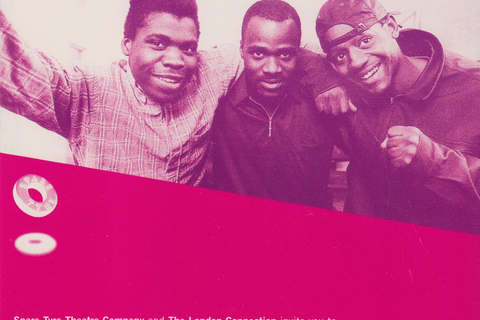 The Dream Factory
The Dream Factory
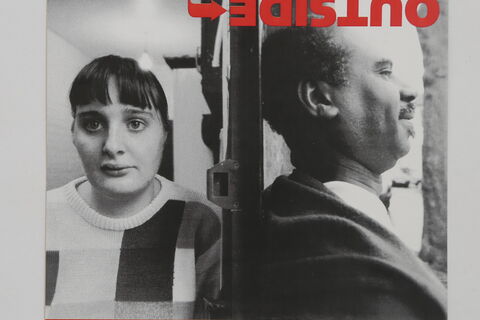 Inside Outside
Inside Outside
 Coming to Camden
Coming to Camden
 Same Meat, Different Gravy
Same Meat, Different Gravy
 Restless Heart
Restless Heart
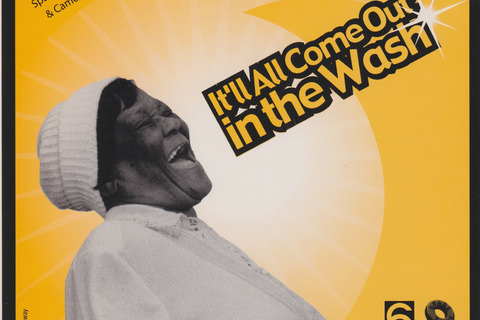 It'll All Come Out in the Wash
It'll All Come Out in the Wash
 Catch Me A Dream
Catch Me A Dream
 Constant Companions
Constant Companions
 Associates... Friends
Associates... Friends
 Shining in the Shadows
Shining in the Shadows
 inc.Theatre
inc.Theatre
 Thank God for the Radio
Thank God for the Radio
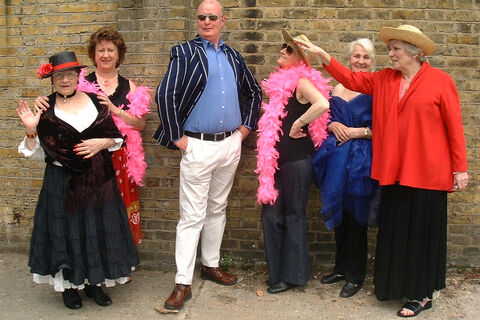 Listen To Me!
Listen To Me!
 SCAT
SCAT
 What's in it For Me?
What's in it For Me?
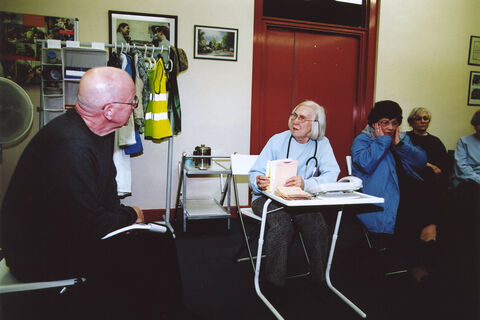 Falling Through the Cracks
Falling Through the Cracks
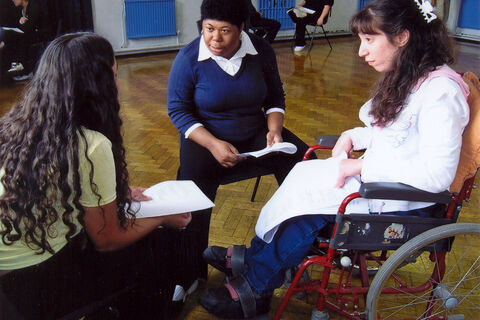 Starcrossed
Starcrossed
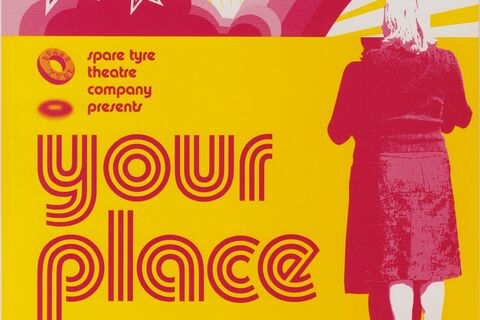 Your Place
Your Place
 Ridiculous Recipes
Ridiculous Recipes
 Other People's Shoes
Other People's Shoes
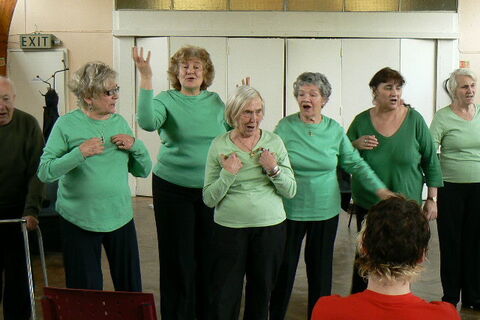 Risky Business
Risky Business
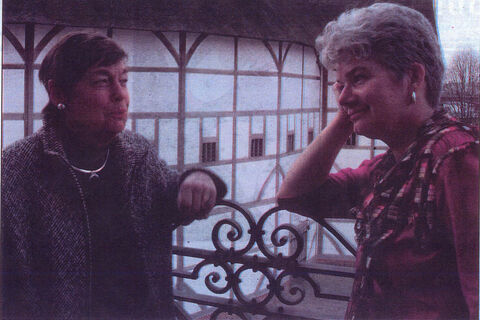 Home Sweet Home
Home Sweet Home
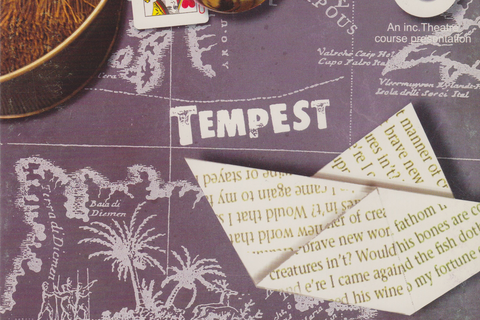 Tempest
Tempest
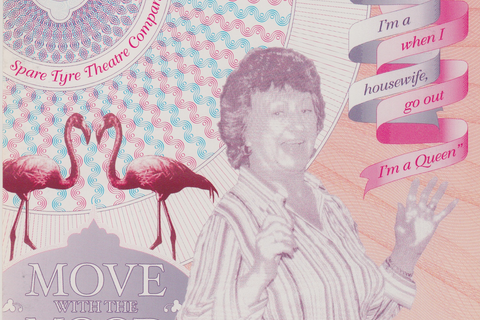 Move with the Mood
Move with the Mood
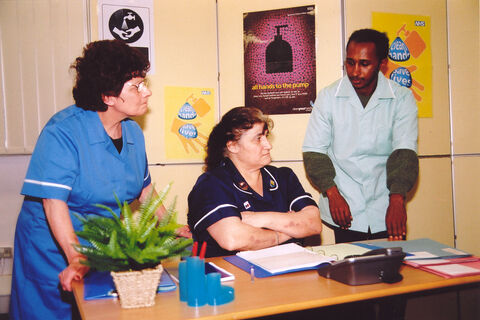 Bedlam!
Bedlam!
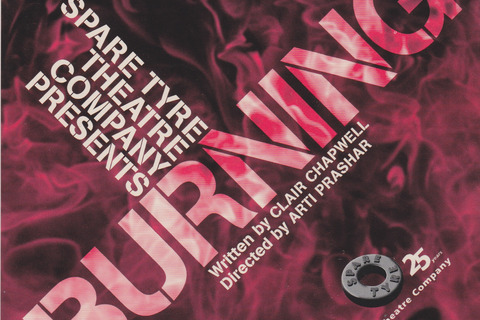 Burning
Burning
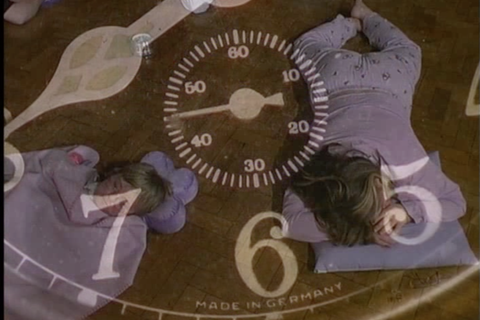 Faust
Faust
 The Art Room
The Art Room
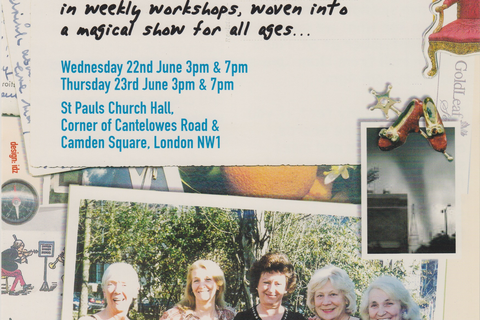 Hot Locations
Hot Locations
 Look At Me...
Look At Me...
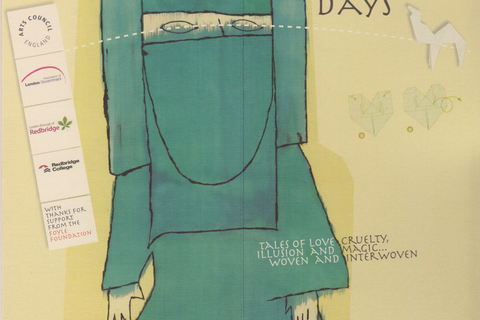 Arabian Nights and Days
Arabian Nights and Days
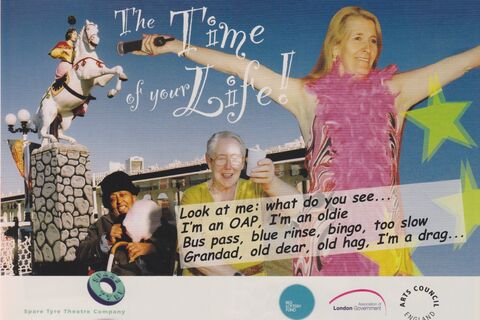 Time of Our Life
Time of Our Life
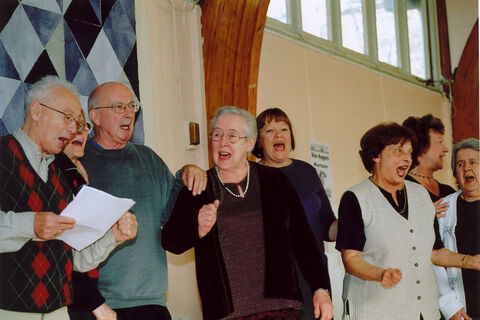 HotPots
HotPots
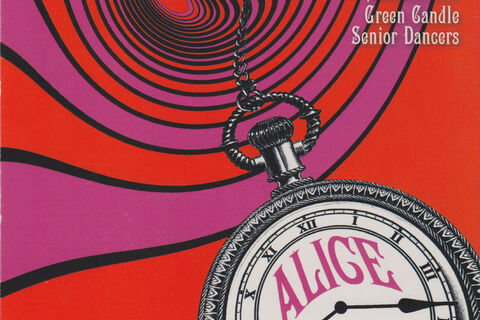 Alice
Alice
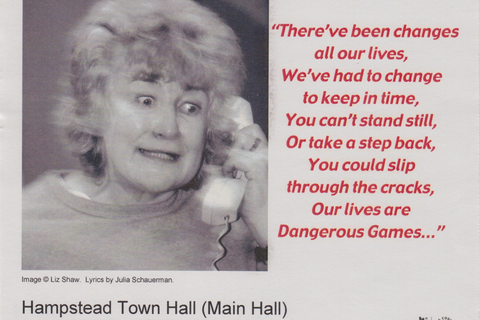 Dangerous Games
Dangerous Games
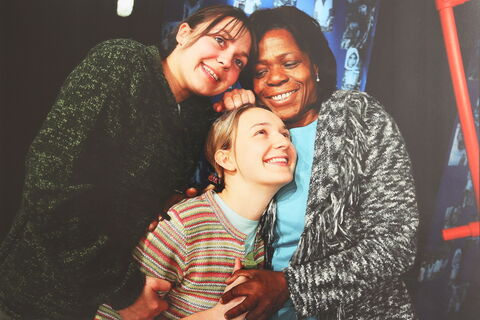 Pretend Families
Pretend Families
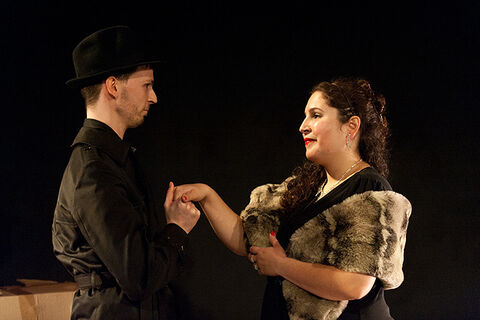 Horrors
Horrors
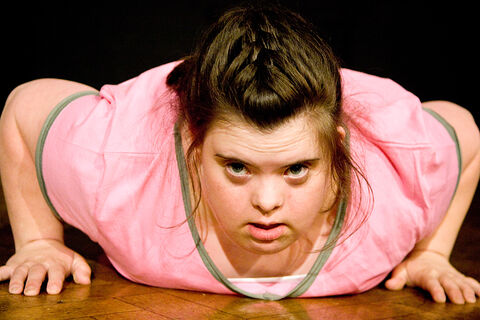 Pieces of Ourselves
Pieces of Ourselves
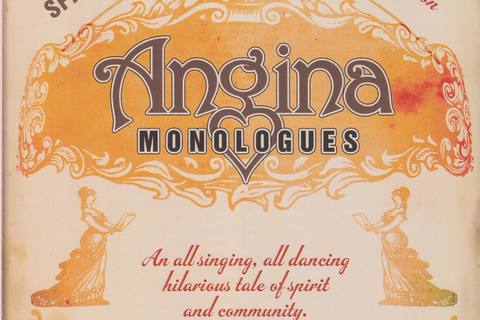 Angina Monologues
Angina Monologues
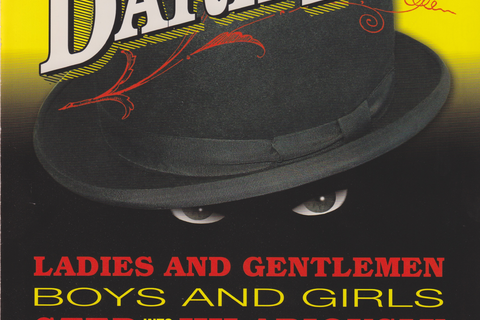 Dark Inc
Dark Inc
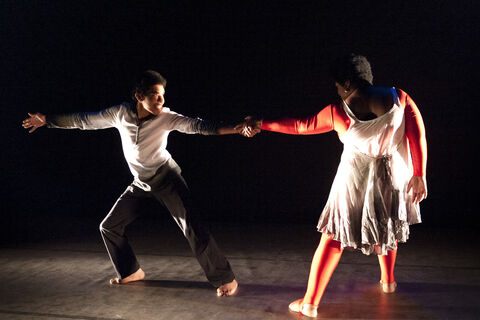 Go Inc. to Work
Go Inc. to Work
 Feeble Minds
Feeble Minds
 SAFE
SAFE
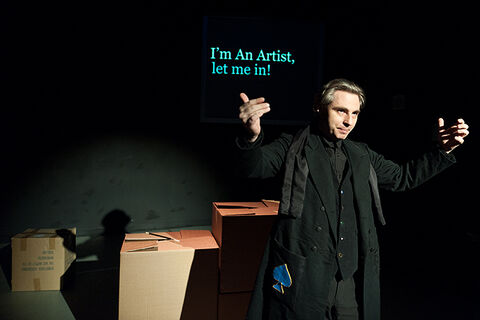 I'm An Artist, Let Me In!
I'm An Artist, Let Me In!
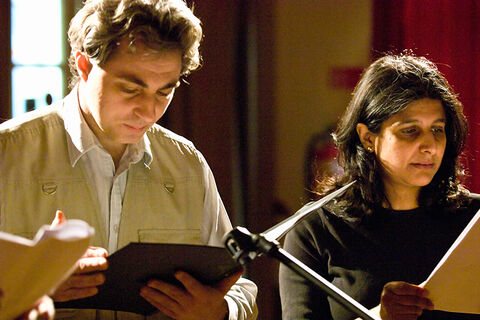 BBC Radio Drama
BBC Radio Drama
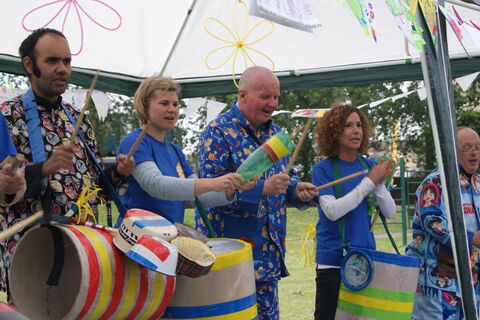 Spare Tyre Band
Spare Tyre Band
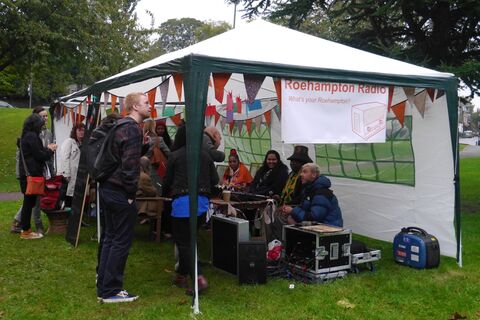 Roehampton
Roehampton
 Once Upon a Time
Once Upon a Time
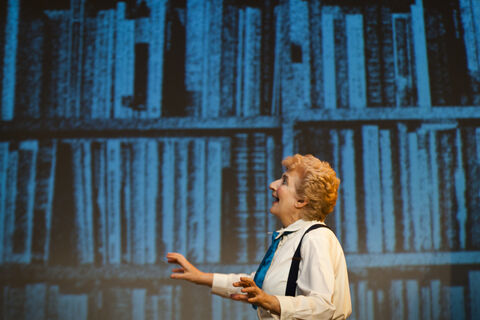 Still Life Dreaming
Still Life Dreaming
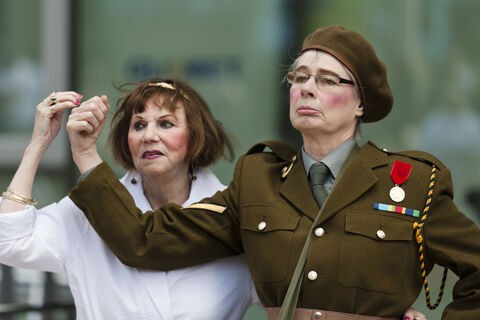 Trojan Women
Trojan Women
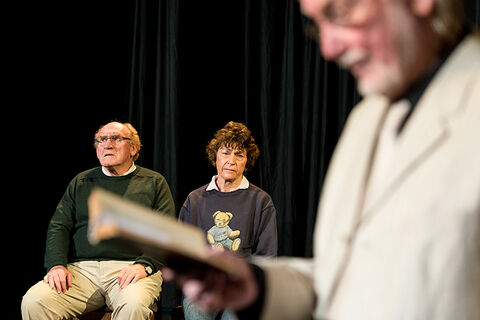 Scratches
Scratches
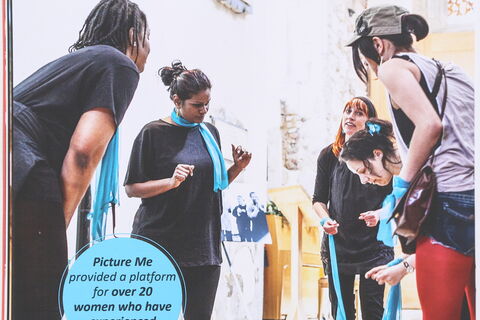 Picture Me
Picture Me
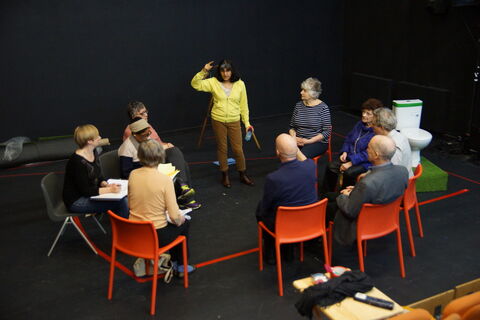 Thinking Space
Thinking Space
 Who Cares?
Who Cares?
 The Experiment
The Experiment
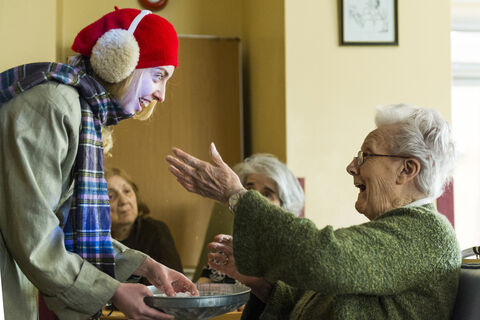 The Garden
The Garden
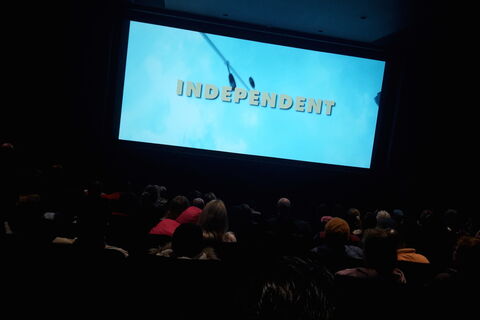 Dear Prime Minister
Dear Prime Minister
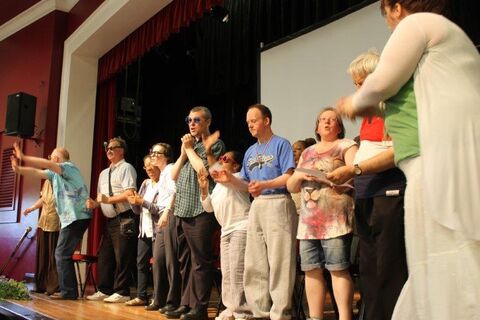 Gone Fishing
Gone Fishing
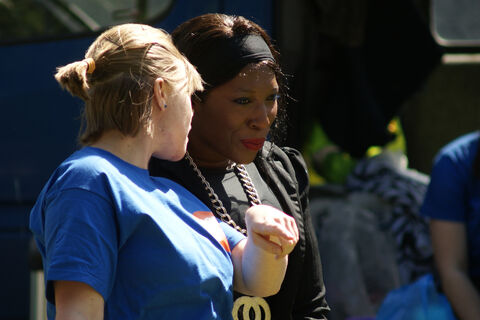 Over the Road
Over the Road
 Nights at the Circus
Nights at the Circus
 Love Is...
Love Is...
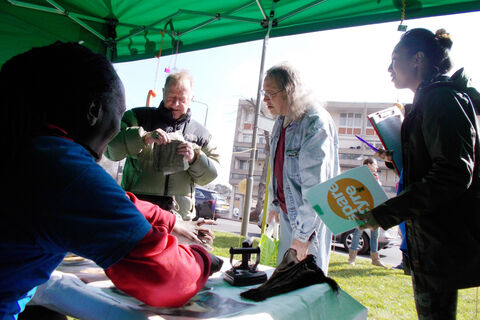 What's Between Us
What's Between Us
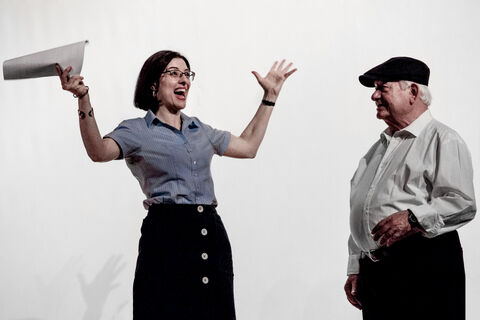 Moving Dreams
Moving Dreams
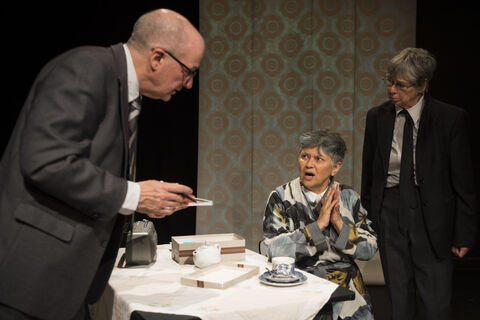 The Promise
The Promise
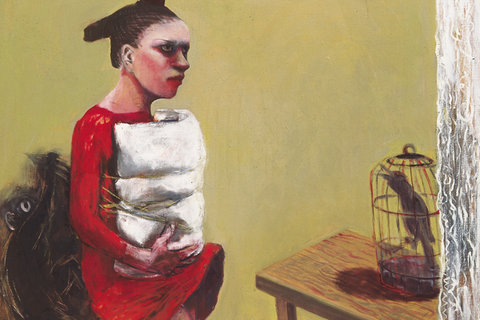 A Tree Without Leaves
A Tree Without Leaves
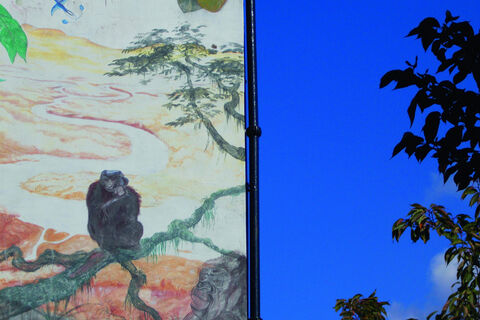 Blue Skies
Blue Skies